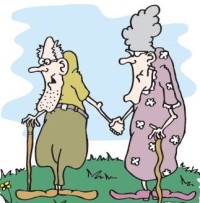After a Knee Replacement
Research demonstrates that functional recovery peaks at 6 months after a knee replacement and that from then on, there is an acceleration of functional decline due to thigh weakness that outpaces normal aging and is not attributable to a lack of range of motion or pain.
In other words, we normally lose muscle mass as a result of aging but a knee replacement can exacerbate and accelerate the problem.
For older adults, losing muscle mass and the weakness caused by the surgery can add to the negative effects of sarcopenia, which is defined as the chronic loss of muscle mass and function associated with normal aging. Sarcopenia is related to physical disability, increased risk of home care, nursing home placement, and hospitalization.
Preventing Muscle Loss After Knee Replacements
A recent clinical trial tested the hypothesis that 21 days of essential amino acid (EAA) supplementation would reduce muscle atrophy and mobility impairments in a patient population of older adults (60–80 years of age) after a knee replacement.
Results showed that taking 20g of essential amino acids two times per day for a 21 day period limited muscle losses in the quad and hamstring 2-4.6 fold at 6 weeks post surgery and may explain the earlier recovery of functional mobility experienced by the supplementation group versus the placebo group.
The researchers tentatively concluded that essential amino acid treatment reduced muscle atrophy and accelerated the return of functional mobility in older adults after a knee replacement.
This is worth watching and considering. These researchers are doing more follow up and I will keep you informed.
Title:
Essential amino acid supplementation in patients following total knee arthroplasty
Authors: Hans C. Dreyer, Lisa A. Strycker, Hilary A. Senesac, Austin D. Hocker, Keith Smolkowski, Steven N. Shah, and Brian A. Jewett
Journal Citation: J Clin Invest. 2013;123(11):4654–4666.
See the full article here :
1. Mizner RL, Petterson SC, Snyder-Mackler L. Quadriceps strength and the time course of functional recovery after total knee arthroplasty. J Orthop Sports Phys Ther. 2005;35(7):424–436.
